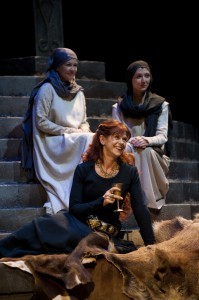
 Highly Recommended ****If you think Macbeth’s death put an end to royal skullduggery in Scotland, you’ve got another think coming. Lady Macbeth didn’t go mad and/or die, she lived on, tormenting Malcolm and his British backers with her very existence. Not quite a ‘sequel’ to Macbeth, the plots, counter-plots, double-crosses, power struggles and sword fights in “Dunsinane ” are deliciously bloodthirsty. A brilliant collaboration from the National Theatre of Scotland and The Royal Shakespeare Company at Chicago Shakespeare Theater, “Dunsinane” gets 4 BIG Spotlights.
Highly Recommended ****If you think Macbeth’s death put an end to royal skullduggery in Scotland, you’ve got another think coming. Lady Macbeth didn’t go mad and/or die, she lived on, tormenting Malcolm and his British backers with her very existence. Not quite a ‘sequel’ to Macbeth, the plots, counter-plots, double-crosses, power struggles and sword fights in “Dunsinane ” are deliciously bloodthirsty. A brilliant collaboration from the National Theatre of Scotland and The Royal Shakespeare Company at Chicago Shakespeare Theater, “Dunsinane” gets 4 BIG Spotlights.
Shakespeare took some serious liberties with Scottish history, but so does “Dunsinane” playwright, David Grieg. Macbeth actually ruled for 17 years. Malcolm did defeat him at Dunsinane Hill, but didn’t murder Macbeth until two years later. Macbeth’s wife Gruach, the granddaughter of King Kenneth III, was royalty in her own right. Her son by her first husband, Lulach, succeeded his stepfather, ruling for just a year before he was murdered. To thicken the plot, his successor Malcolm III was Siward’s (the Duke of Northumberland) sister’s son.
“Dunsinane” is the first battle for a Boy Soldier (Tom Gill), whose recollections are interspersed with the story. The Scots have been defeated and Macbeth is dead. His widow, Gruach (Siobhan Redmond), sends her son, Lulach (Fred Geyer), out of Dunsinane to keep him safe.
The British force, led by Siward (Darrell D’Silva), Duke of Northumberland, and the Scottish traitor, Macduff (Keith Fleming), is determined to put Malcolm on the Scottish throne. Siward, an honorable commander, bans all the rape and pillage customary after one army defeats another. Malcolm, on the other hand, has no qualms about eliminating any and all of his perceived enemies, even if they’re children. He’s positively gleeful as he explains the Scottish psyche to his commander.
Siward visits the clans, trying to get the lairds to unite behind Malcolm. He and Gruach fence and parry, ultimately ending up in bed together. Trying to impose a peace, he proposes a marriage between Gruach and Malcolm. At an ensuing celebration, Gruach double-crosses the British who suffer a minor defeat. Obsessed with finding Lulach, Siward goes on a scorched-earth campaign through the countryside. 
“Dunsinane” has many modern parallels, most recently in Afghanistan and Iraq. Historically, the British were known for their cruelty to the conquered – they were especially vicious to the Scots and the Irish – but they are certainly not unique.
Maybe because Brits played Brits and Scots played Scots, “Dunsinane” felt real. Although “Dunsinane” has nothing in common with another Grieg play, “The Strange Undoing of Prudencia Hart” – a CST World Stage hit in 2012 – the audience has the same feeling of involvement.
“Dunsinane” runs through March 22nd in the Courtyard Theater, Chicago Shakespeare Theatre on Navy Pier. Performances are Tuesdays, Thursdays and Fridays at 7:30; Wednesdays at 1:00 and 7:30; Saturdays at 3:00 and 8:00; and Sundays at 2:00. Running time is 2 ½ hours including an intermission. Tickets range from $58-$78. CST patrons receive a 40% discount on parking in the Navy Pier Garages, so remember to get your ticket validated in the CST lobby or at the box office. FYI (312) 595-5600 or www.chicagoshakes.com.
To see what others are saying, visit www.theatreinchicago.com, go to Review Round-up and click at “Dunsinane”






More Stories
“Joe Turner’s Come and Gone”
“How I Learned What I Learned” reviewed by Julia W. Rath
“How to Know the Wild Flowers: A Map” reviewed by Julia W. Rath